In this roundup of court judgements, we look at Constitutional Courts’ remarks & directions on personal law, not overriding POCSO and other such laws, BSNL violating norms of fairness, a good conscience, and equity in a private contract, etc. We also look at the important points in GoI’s affidavit to the SC on the vaccine policy.
GOI’s submission in the SC on the COVID-19 Vaccine Policy
In pursuance of the suo moto case in the Supreme Court (SC) on the management of the COVID-19 pandemic, the central government has submitted an affidavit before the scheduled hearing on 30 June 2021. The affidavit is a response to the questions raised and issued flags regarding the vaccine policy. In our previous review, we have detailed the observations made by the apex court and changes made to the vaccination policy.
On the question of vaccine availability and projections, the following was highlighted by the Government of India (GoI).
- A total of 51.6 crores will be available from January 2021 to 31 July 2021.
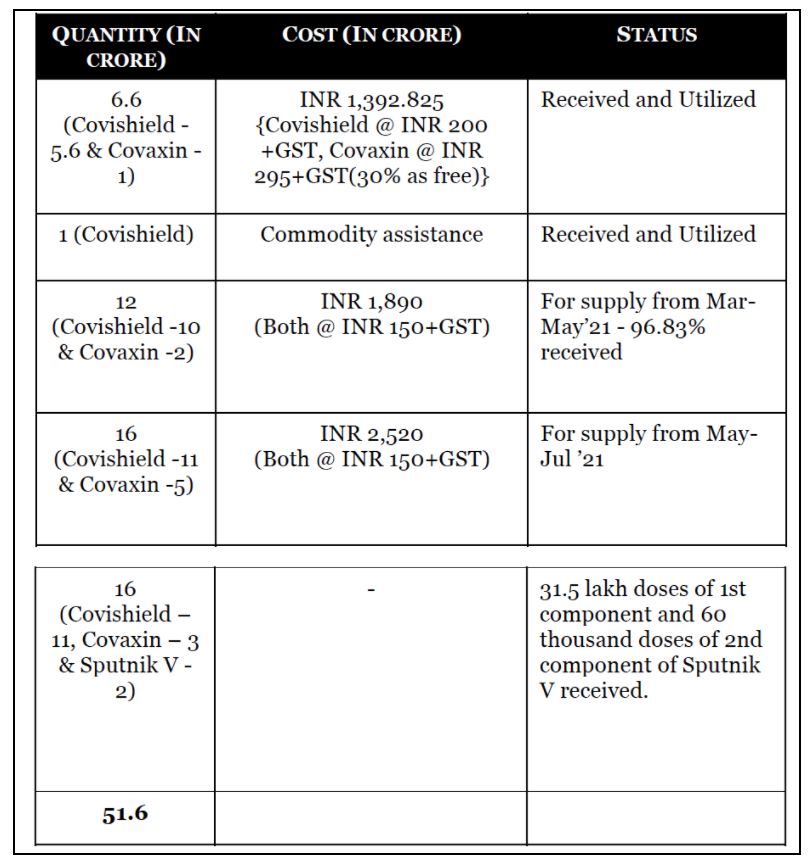
- As per the projected midyear population for 2020, the total population of the country aged 18 years and above is approximately 93-94 crore. Administering two doses to these beneficiaries would require an estimated 186 to 188 crore vaccine doses. Out of this requirement, 51.6 crore doses will be made available for administration by 31 July 2021 leaving a requirement of approximately 135 crore vaccine doses for complete vaccination to the eligible population.
- Details of the projected availability of COVID-19 vaccines from August 2021 to December 2021 are as follows:
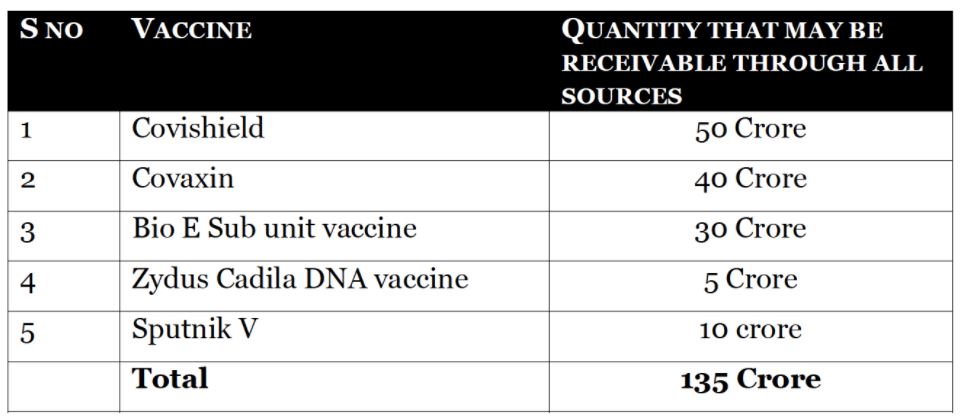
- As stated above, it is expected that there would be the availability of vaccines to vaccinate the entire eligible population. The vaccination drive would get a boost if the Government of India succeeds in its attempts to procure vaccines available outside India such as vaccines of Pfizer, Johnson & Johnson, Moderna, etc.
- Moreover, Zydus Cadila which is developing DNA vaccines has concluded its clinical trial for the age group of 12 to 18 years of age and subject to the statutory permissions, the same may be available in near future for children of the age group of 12 to 18 years of age.
On the question of the use of the Co-WIN platform, the following was highlighted by the GoI.
- Walk-in (on-sight registration) vaccination is permissible for all, and the digital divide is not a constraint for access to vaccination. Onsite registrations and vaccinations have been permitted for all the beneficiaries since 23 May 2021, which was, till that date, available only for the 45 plus age group.
- The facility for assisted registrations through the 1075 Help Line has also been operationalized and is functioning effectively.
- To further improve access for citizens as well as field functionaries operating the Co-WIN portal, the multilingual citizen and user interfaces are now available in 12 languages on Co-WIN. These languages are – Hindi, Marathi, Malayalam, Telugu, Kannada, Oriya, Gurumukhi, Bengali, Assamese, Tamil, Gujarati, and English.
- To improve access for those who are visually challenged, enabling features like an alternative to Captcha, text resizing, the keyboard support for navigation, etc.
On the question of door-to-door vaccination, the Centre clarified against ‘door-to-door vaccination’ citing several feasibility issues, and has suggested that ‘near-to-home vaccination’ as a viable alternative.
- Door-to-door vaccination for the disabled is not provisioned under the National COVID-19 Vaccination Programme because of issues such as the risk of break-in cold chain, vaccine wastage, delay in reaching health facilities resulting in the derailment of time schedule of the vaccination programme, etc.
- The committee of domain knowledge experts constituted by MoHFW, recommended a community-based approach of Near-to-Home COVID Vaccination Centres (NHCVCs) for the differently-abled and elderly citizens. This strategy has also been endorsed by the National Expert Group on Vaccine Administration for COVID-19 (NEGVAC), which has both government & non-government experts.
- To enhance the inclusivity of the vaccination programme, the district level officers of the Disability/Social Welfare department should be made nodal officers for the purpose of dealing with grievances.
- States have been asked to make special arrangements for their vaccination through Near-to-Home Covid Vaccination Centres (CVCs).
On the question of coverage of vaccination in tribal areas, the GoI’s affidavit furnished the data available on Co-WIN as of 23 June 2021 and stated the following:
- Vaccination coverage per million population in tribal areas is better than the national average.
- 97 out of 176 Tribal Districts are performing better than all India vaccination coverage.
- More walk-in vaccinations are happening in Tribal Districts as compared to National average.
- The gender ratio for people vaccinated is better in the tribal districts.
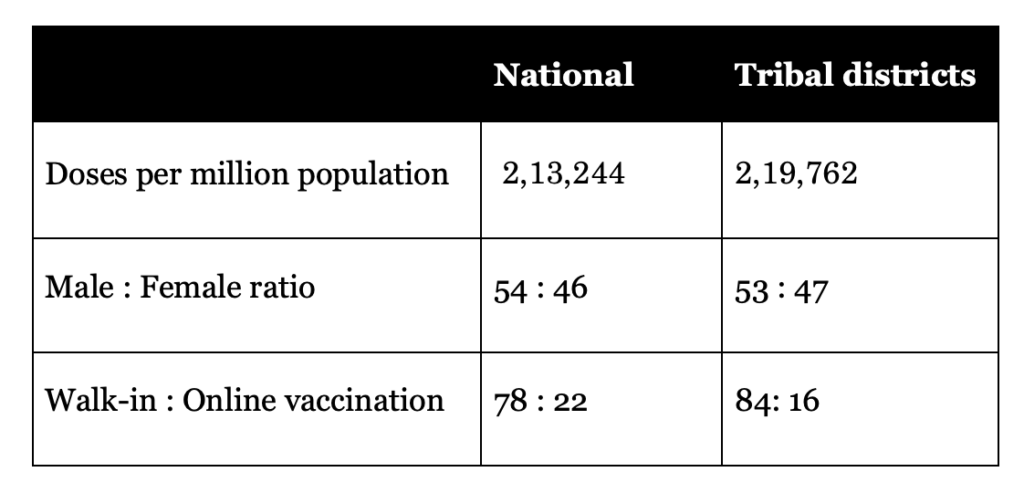
On the question of vaccination of crematorium workers and panchayat workers, the following was clarified:
- It is submitted that crematorium workers (regardless of the employment status of being permanent, contractual, outsourced, or manpower working with a contractor with or without any designation) who are engaged in working in cremation grounds are already included under ‘municipal workers group’ under the ‘Frontline Workers category’.
- Similarly, panchayat workers in rural areas involved in COVID-19 activities are also included in the ‘Frontline Workers category’.
On the question of utilization of funds for vaccine procurement till date, the following details were furnished:
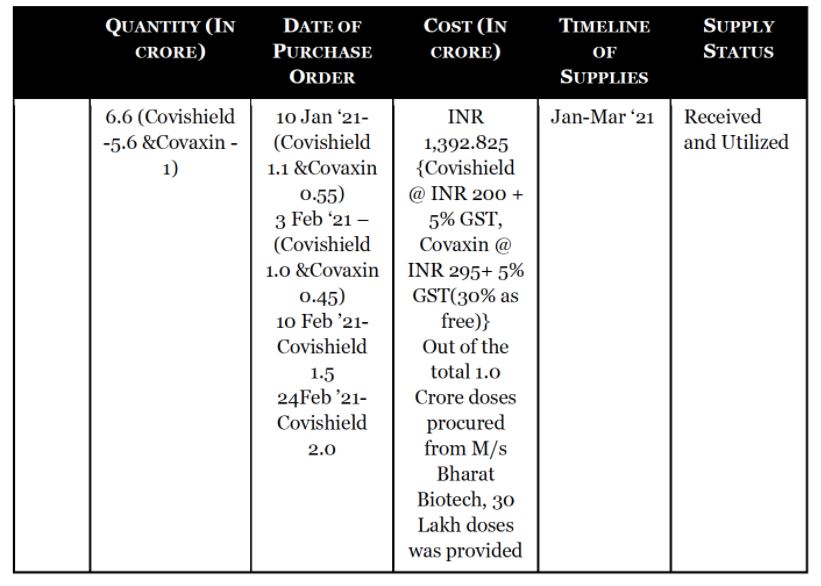
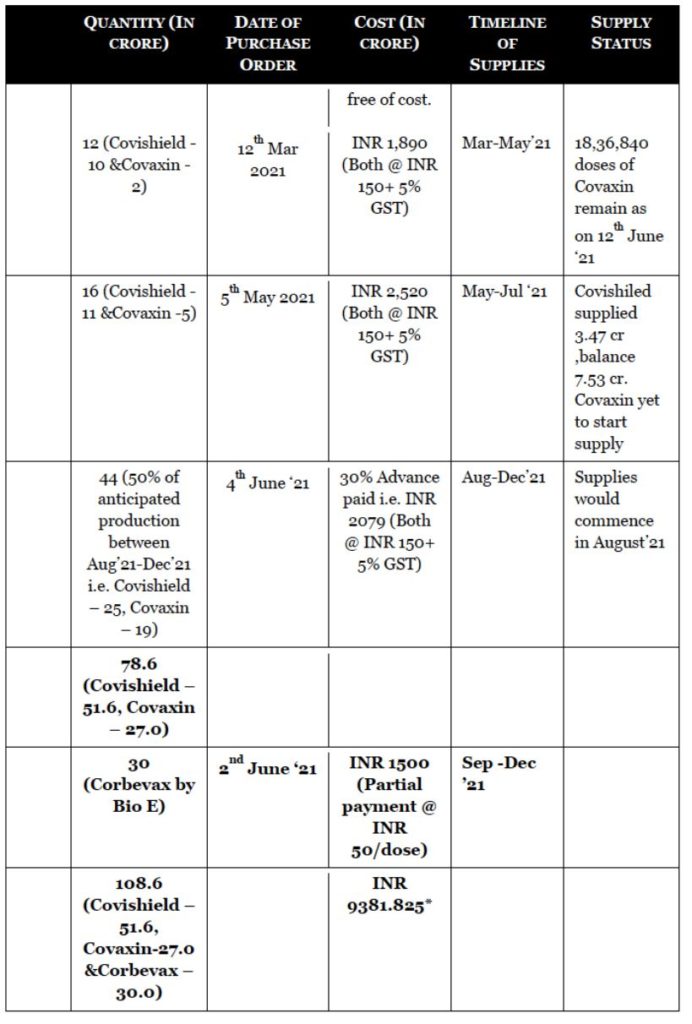
Karnataka HC: Personal Law cannot override POCSO, Child Marriage Restraints Act and Penal Code
In the case State of Karnataka vs. Mrs. Shahinabanu, the high court held that though second marriage is permissible under Muslim Personal Law, but the personal law cannot override the Special Law of POCSO, Child Marriage Restraints Act, and General Penal Code of this Country.
The high court was hearing the bail application filed by Rahul alias Nayaz Pasha, who is accused of abducting, sexually assaulting, and marrying a 15-year girl.
The bench of Justice K Natarajan observed that the age of the victim is 15 years. The marriage certificate is said to be issued by some Mosque by its Secretary or Mutavali, wherein the signature of the victim was obtained, and the marriage was performed showing the age of the victim as 19 years.
The petitioner-accused appeared through an advocate and produced the affidavit of the victim stating that the victim herself went along with the accused and got married and she is residing in his house. The court noted that while the statement of the victim reveals that she herself voluntarily went and married the accused as per their customs, the age of the victim is 15 years, and her consent is immaterial. Though second marriage is permissible under Muslim Personal Law, the personal law cannot override the Special Law of POCSO, Child Marriage Restraints Act, and General Penal Code of this Country.
Even if the minor girl gives ‘no objection’ to release the accused in a heinous crime like rape on a minor girl and granting bail to the accused, it is nothing but giving license to the offender to commit similar offences. Therefore, in the interest of the public at large and with an intention to curtail such types of sexual offences, the high court concluded that it shall ignore the consent of a minor girl giving ‘no objection’ for granting bail to the accused and the court shall deal with such a heinous offence with an iron hand.
Kerala HC: No prima facie reason to exclude meat from mid-day meal in Lakshadweep
In a Public Interest Litigation challenging the removal of non-vegetarian items from the food menu of government schools in Lakshadweep, the high court held that it does not find any prima facie reason for the change of food items, with the exclusion of meat and chicken and passed an interim order to stay the said decision.
The court was hearing a PIL filed by a lawyer from Lakshadweep who challenged, among other things, the removal of non-vegetarian items from the food menu of school children.
According to the petitioner, the Union Territory of Lakshadweep has ten islands, mostly inhabited by Scheduled Castes and Scheduled Tribes. The counsel for the petitioner submitted that without assigning reasons, the Administrator, Union Territory of Lakshadweep, has directed to close all the dairy farms run by the Department of Animal Husbandry, including Bulls, Calves, Heifers, and Ducks, etc., immediately. The Veterinary Assistant Surgeons of all the Veterinary Units were directed to dispose of the available animals in the presence of Auction Committee Members.
Since Mid-Day Meal (MDM) Scheme was introduced, a menu was implemented in all the schools of Lakshadweep and as per the guidelines, meat and chicken were served, and that there is no defect or irregularity noticed by the stakeholders. Counsel for the petitioner further submitted that contrary to the National Programme of Mid-Day Meal in Schools (MDMS) Annual Work Plan and Budget 2020-21, wherein, there is a provision, to provide meat and chicken in the menu, to the children of the schools of Union Territory of Lakshadweep, suddenly a decision has been taken not to provide chicken and meat to the children.
This is weekly menu under MDM scheme:
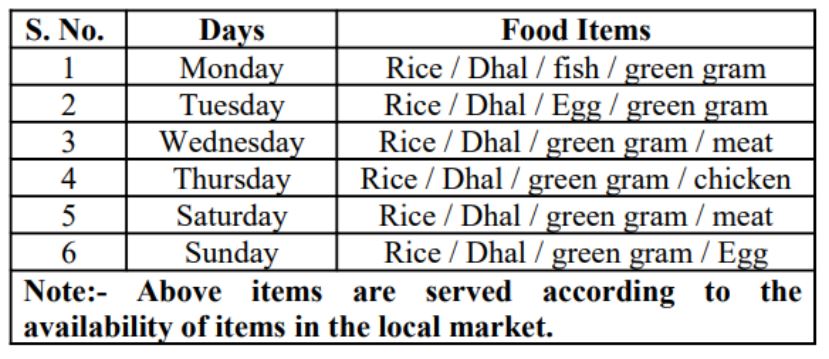
This is the proposed new menu under MDM scheme:
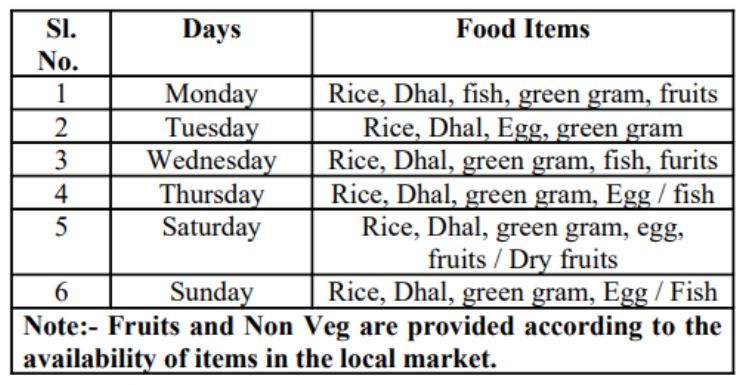
The counsel for the petitioner also submitted that all along, food for the children to be served was prepared and distributed by the stakeholders, within the island, using the manpower of islanders, which is one of the sources of employment. Now, the Administrator, Union Territory of Lakshadweep, has taken a decision to entrust the work relating to the preparation of food for MDM to an NGO named Akshayapatra, whose offices are situated in Bangalore.
According to the standing counsel, there are two dairy farms in the Union Territory of Lakshadweep and there are 69 animals, out of which, 47 are only milking. The total quantity of milk milched is 140 litres per day. The maintenance of two farms, with a production of very little quantity, is not financially viable. Hence, he submitted that a policy decision was taken to prevent revenue loss.
He further added that there is no proposal from the Director of Education, to allocate the work of preparation and distribution of food by Akshaya Patra. It was only decided to have an informal talk with Akshayapatra regarding the implementation of Mid-Day Meal in the Union Territory of Lakshadweep.
After hearing both sides, the prima facie, the court was of the view that switching over to a different menu, with the exclusion of chicken and meat, would run contrary to the annual plan of MDM, which indicates that food must be served to the children, including meat, chicken, fish, and egg, apart from other items. The court noted that the Committee seemed to have suggested food, with the exclusion of meat and chicken, despite the opinion of a Physician present in the meeting who highlighted that non-vegetarian foods (fish, chicken, and egg) are essential for the growth of children and that children need a healthy balanced diet containing foods from each group (veg along with non-veg) so that they get a wide range of nutrients.
The high court concluded that since it does not find any prima facie reason for the change of food items, with the exclusion of meat and chicken, an interim order is passed directing the respondents, to provide food, as done before, by including meat and chicken, to the children of the schools in Lakshadweep.
Madras HC: Textbook example of state instrumentality’s unjust enrichment
In the case A.S.Marimuthu vs. Ministry of Telecommunications, the high court held that BSNL violated norms of fairness, a good conscience, and equity in virtually grabbing the property belonging to one A. S. Marimuthu by paying a paltry sum of just one rupee.
The high court was hearing the plea of the petitioner, Marimuthu who gave property measuring an extent of 59 cents to BSNL in return for a token consideration of one rupee. The grievance of the petitioner was that no construction came up for nearly 13 years and, the present writ petition was filed in the year 2014 seeking the cancellation/reconveyance of the property in favour of the petitioner.
The petitioner had purchased this property with the laudable object of constructing a memorial for his father, who is claimed to be a philanthropist and a successful businessman and at that point in time, BSNL was looking for a property to construct a telephone exchange. The petitioner wished to gift this property to BSNL free of cost with the only condition that the building in which the telephone exchange is operated, will stand in the name of the father of the petitioner. However, BSNL took a stand that they cannot get the property as a gift or settlement and therefore insisted that a sale deed should be executed by receiving a token consideration. Thus, a token consideration of Rupee one was given, and the petitioner stated is more interested in the building being named after his illustrious father.
The representation from the Ministry and BSNL categorically stated that the construction of the telephone exchange did not go through due to procedural formalities and administrative difficulties. It is also stated that even if a building is constructed, it will not be named after the father of the petitioner. A vague allegation has been made to the effect that there is still a proposal to construct the telephone exchange.
Upon considering both sides, the court noted that admittedly, the property had been conveyed by the petitioner in the year 2001 in favour of BSNL by receiving a token consideration of one rupee. However, the only reason the petitioner conveyed a land measuring 59 cents for a pittance by receiving one rupee is for the condition that the building in which the telephone exchange is operated will stand in the name of the father of the petitioner.
The high court opined that in a petition under Article 226, a writ court is under a constitutional obligation to probe and satisfy its conscience that the action of the State or instrumentality of the State is fair and not arbitrary. BSNL being an instrumentality of the State is bound to act reasonably and fairly in its dealings with citizens. It is settled law that a greater degree of probity and fairness is expected from state agencies since any act which fails to satisfy the test of reasonableness would be violative of Article 14.
The judgement elaborates that in the present case, BSNL has entered into a contract with a citizen paying him a token amount and promising to put up a building on the premises. Having induced the petitioner to part with his property on these terms, the BSNL reneged on its promise to put up a building. The net result is that the petitioner has been deprived of a valuable property of 59 cents for just one rupee.
The judgement states that the question, therefore, is what the power of the Court under Article 226 is to annul what it considers a wholly unfair, arbitrary, and unreasonable contract involving a state agency.
The court noted that it is well settled that where arbitrariness exists at the time of entering into a contract, the same would offend Article 14, enabling the writ Court to annul such an action. The sale in question is opposed to all norms of fairness, a good conscience, and equity. When the State or its instrumentalities enter into a private contract, it is expected that they maintain a higher degree of fairness and reasonableness.
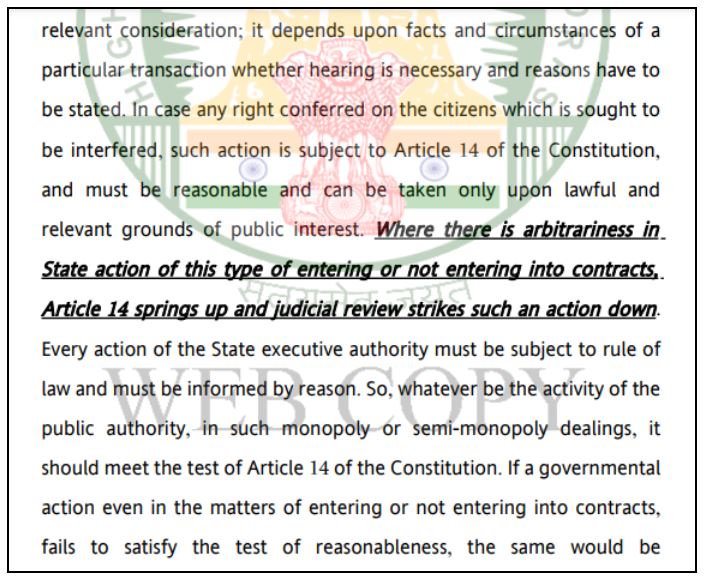
In view of the above, the Court concluded that the contract entered into between the petitioner and BSNL by virtue of the sale deed dated 06 September 2001, is totally unfair, arbitrary, and unreasonable. Therefore, the court issued a direction to the respondents to pay the market value of the property as it stood on the date of execution of the sale deed (that is on 06 September 2001) along with interest at the rate of 9% per annum from 06 September 2001 till the date of the payment of the market value. In the alternative, it is also open to the respondents to reconvey the property to the petitioner if there is no proposal to construct any telephone exchange in the property. In either case, the respondents were directed to comply with this direction of the court within a period of eight weeks from the date of receipt of a copy of the order.
Featured Image: Important Court Judgements


